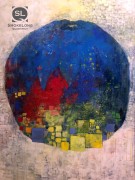In your story, “Comatose,” I sense so much discontentment, even disillusionment, from the characters—Aziz’s wife and their children who are now grown—and from the people he served (or failed to serve) as a government official before his coma. Aziz seems to be the catalyst in this story, has so much agency, still, despite being in a coma. Can you talk more about how his character came to be and how you intended him to function in this story?
Aziz’s coma is one of the many stories I heard in my childhood. My dad talked about Aziz one afternoon during lunch and his story lingered with me. The good thing about writing fiction is when you devote yourself entirely to it, it digs into your past subconsciously.
The agency of Aziz resides in the absence of patriarchal power. Aziz had the coma in the 1990s, long before feminist and liberal waves started seeping into the lives of Arabian households who no longer needed the authority of the father or the oldest brother to steer their lives. The sudden collapse of Aziz is, in fact, a build-up collapse of the family, especially the wife, who finds it hard to euthanize Aziz.
Aziz’s ruthlessness with the poor cost him not only his consciousness, but also the life of his youngest son. It is a story of illusion and worthless loyalty that wastes the present and the future while holding tenaciously to the past.
Who or what are some of the biggest influences on your writing that you can pinpoint in this particular story?
This is a good question. My husband, Ali, has the significant credit to encourage me to write. It is not common among Arabians to marry someone who is an avid reader and who prioritizes seeing your work published before thinking what dish he is going to have for dinner. Ali is this person. Having a supporting husband is one of the best blessings in life.
When it comes to other influential elements, being raised in a storytelling community provided me with a reservoir of characters. In every family gathering, there is an exciting or appalling story. It never really mattered to me who the person is, or whether I know his family or not. I write better about the characters I’ve never seen but heard of their agony. In Aziz’s case, I asked Dad a few years ago about him and he was still in a coma. This story is an answer to my own question about Aziz’s situation.
How did you get into writing fiction?
Reading Edward Said’s Orientalism stirred me to specialize in fiction. I was at the University of Sydney back then, in 2011, pursuing my master degree in creative writing. One of my Australian professors recommended the book, and I found Said’s observation of the Arabs’ minimal if rare account to represent themselves painfully true. While I was doing exceptionally well in screenwriting, I didn’t buy the concept of having my script controlled by a film director, let alone become one. I wanted total control of my artwork. Even the professor who recommended Said’s book saw me the best fit for screenwriting, but I wanted to try fiction. My first workshop was a disaster. The instructor was harsh and she kind of pushed me away from pursuing this field. I am stubborn.
After the program, we went back home to Saudi Arabia; I worked on polishing my fiction skills and published my first story in 2014. A year later, I attended Tom Jenks’ creative writing workshop in San Francisco, and I saw how positive the American fiction writing milieu is, especially in terms of the small number of students and the insightful comments. The story workshopped in San Francisco became my first print publication and it sort of opened the door of fiction before me.
What keeps you writing?
My 3 Ps: Pain, Patriotism, and Pleasure.
I am not a victim of child abuse or a repressed household. I am a person who loves her homeland and finds it compelling to write about the emotions, struggles, and minute details that can only be represented in fiction. Journalism has provided a particular paradigm of Arabia. I am writing stories to offer my account as native Arabian writing in her second language.
I also write for pleasure. Although most of my writing is melancholic, it pleases me to start the day sitting on my computer to write. At the end of the day, I shift my writerly tone to a motherly one. My three kids enjoy the stories of fiction I create solely for them. Theirs are more bright and positive to help them sleep better.
Who are you reading currently?
Currently, I am reading Deleuze and Guattari’s philosophical book A Thousand Plateaus. One of the advantages of grad school is the opportunity to get exposed to brilliant books that you rarely pick in normal life.



 The core workshop of SmokeLong Fitness is all in writing, so you can take part from anywhere at anytime. We are excited about creating a supportive, consistent and structured environment for flash writers to work on their craft in a community. We are thrilled and proud to say that our workshop participants have won, placed, or been listed in every major flash competition. Community works.
The core workshop of SmokeLong Fitness is all in writing, so you can take part from anywhere at anytime. We are excited about creating a supportive, consistent and structured environment for flash writers to work on their craft in a community. We are thrilled and proud to say that our workshop participants have won, placed, or been listed in every major flash competition. Community works.